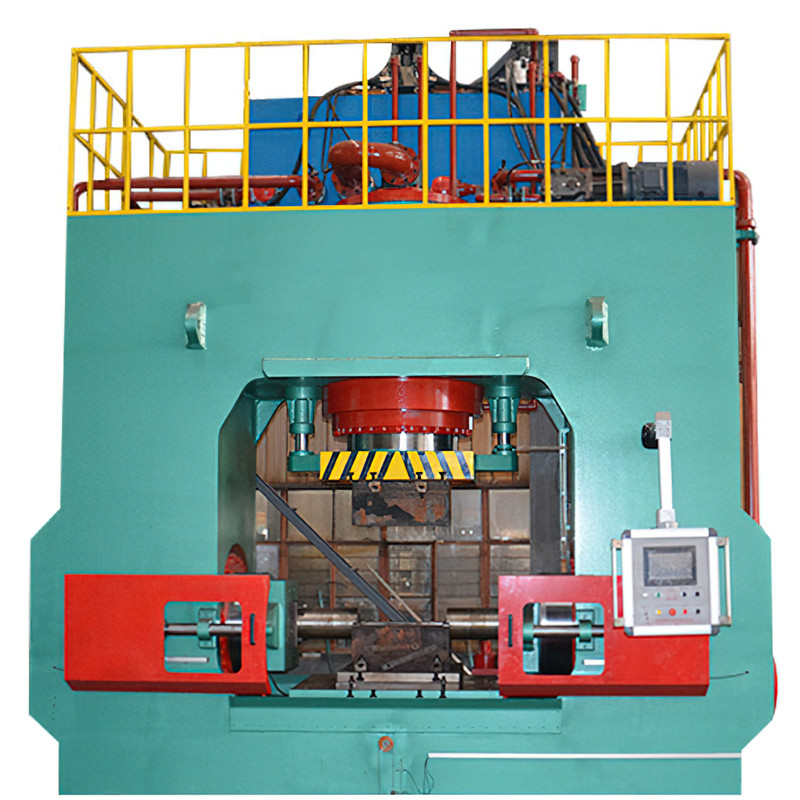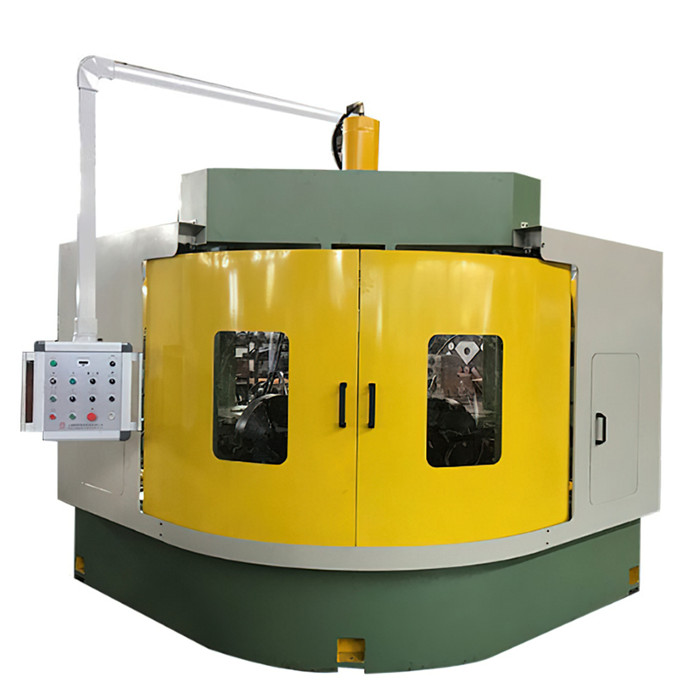A pipe fittings machine is a specialized piece of equipment used for manufacturing, processing, and assembling pipe fittings, including elbows, tees, reducers, couplings, and flanges, which are essential components in piping systems for connecting and directing flow. These machines are designed to handle various tasks such as cutting, bending, forming, threading, grooving, welding, and assembling pipe fittings, enabling precise fabrication to meet industry standards and specifications. They are widely used in industries such as oil and gas, petrochemicals, construction, water treatment, power generation, and shipbuilding, where robust and accurate fittings are required to ensure the safety, reliability, and efficiency of piping systems. Pipe fittings machines can be classified based on their functions, including hydraulic press machines for forming and bending, CNC machining centers for precision cutting and threading, welding machines for joining fittings, and automatic assembly machines for large-scale production. Hydraulic presses are used for shaping and forming fittings, providing high-pressure force to mold materials into the desired shapes, while CNC machines offer advanced control for cutting threads, drilling holes, and creating complex designs with high accuracy. Welding machines, including MIG, TIG, and spot welders, ensure strong and leak-proof joints, essential for high-pressure and high-temperature systems. Automatic assembly machines streamline production by assembling components quickly and consistently, improving efficiency and reducing labor costs. The materials processed by these machines include carbon steel, stainless steel, alloy steel, brass, copper, PVC, and CPVC, each selected based on application requirements such as corrosion resistance, pressure ratings, and temperature tolerance. Modern pipe fittings machines incorporate advanced technologies such as computer numerical control (CNC), programmable logic controllers (PLC), and automated feeding systems to enhance precision, productivity, and ease of operation. These features allow operators to program and monitor processes, reducing errors and ensuring consistency in production. Safety systems, including emergency stops, overload protection, and guarding mechanisms, are integrated to protect workers and equipment during operation. Regular maintenance and calibration of pipe fittings machines are essential to maintaining accuracy and extending service life. Compliance with international standards such as ASME, ANSI, ISO, and ASTM ensures the quality and compatibility of the produced fittings, meeting global industry requirements. As the demand for customized fittings increases, pipe fittings machines continue to evolve, offering greater flexibility, automation, and efficiency to meet diverse production needs in modern industrial applications.
What Are The Different Types Of Pipe Fittings Machines, And How Are They Used In Manufacturing Processes?
Pipe fittings machines come in various types, each designed to perform specific tasks in the manufacturing and processing of fittings used in piping systems. Common types include hydraulic presses, CNC machining centers, threading machines, grooving machines, welding machines, and bending machines, each contributing to precise fabrication and assembly. Hydraulic press machines are widely used for forming and shaping fittings, applying high-pressure force to mold materials into desired shapes such as elbows, tees, and reducers, ensuring uniform thickness and structural integrity. CNC machining centers provide advanced control for cutting, drilling, and threading operations, allowing for complex designs with high precision and repeatability, making them ideal for custom fittings and mass production. Threading machines are designed to create internal and external threads on pipes and fittings, ensuring secure connections for plumbing, gas, and fluid transport systems. Grooving machines prepare pipe ends for grooved fittings, enabling quick assembly and disassembly without welding, commonly used in fire protection and HVAC systems. Welding machines, including MIG, TIG, and spot welders, join fittings to pipes, creating strong and leak-proof connections for high-pressure and high-temperature applications. Bending machines are used to create precise bends and curves in pipes, essential for complex layouts and systems requiring directional changes. Each machine is constructed to handle specific materials, including stainless steel, carbon steel, brass, copper, PVC, and CPVC, depending on industry requirements. Modern pipe fittings machines are equipped with computer numerical control (CNC) and programmable logic controllers (PLC) to automate operations, enhance accuracy, and reduce manual errors, improving productivity and consistency. Automated feeding systems, tool changers, and monitoring sensors further optimize performance, reducing downtime and increasing output. Safety features such as emergency stops, overload protection, and guarding mechanisms ensure operator safety and equipment protection during operation. Regular maintenance and calibration of machines are necessary to preserve accuracy, prevent breakdowns, and extend service life. Compliance with industry standards such as ASME, ANSI, ISO, and ASTM guarantees the quality and compatibility of the produced fittings. As technology advances, pipe fittings machines continue to evolve with enhanced automation, precision, and energy efficiency, meeting the growing demand for customized and high-performance fittings in industrial applications.
What Factors Should Be Considered When Selecting A Pipe Fittings Machine For Industrial Use?
Selecting the right pipe fittings machine for industrial use requires careful evaluation of several factors to ensure performance, efficiency, and compatibility with production requirements. The first consideration is the type of fittings to be manufactured, as machines are designed for specific tasks such as cutting, threading, bending, welding, or forming, and the machine must match the production needs. Material compatibility is another critical factor, as the machine should handle materials such as carbon steel, stainless steel, brass, copper, PVC, and CPVC, depending on the application requirements for corrosion resistance, strength, and temperature tolerance. Production capacity and automation level must align with the scale of operations, with high-volume manufacturing facilities benefiting from CNC and PLC-controlled machines for automated processes, precision, and consistency. Flexibility in handling different sizes and shapes of fittings is important, especially for custom or complex designs, requiring machines with adjustable settings and tool-changing capabilities. Accuracy and precision are vital, particularly in industries such as oil and gas, pharmaceuticals, and food processing, where leak-proof connections and compliance with stringent standards are essential. Safety features, including emergency stops, overload protection, and guarding systems, protect operators and equipment, ensuring safe and reliable operation. Energy efficiency and maintenance requirements should also be considered to reduce operational costs and downtime, with machines designed for easy maintenance and long service life. Compliance with industry standards such as ASME, ANSI, ISO, and ASTM guarantees the quality, performance, and compatibility of fittings with global systems. Software integration and data monitoring capabilities in modern machines enhance control, diagnostics, and predictive maintenance, minimizing errors and improving efficiency. Training and technical support from manufacturers ensure proper installation, operation, and maintenance, further enhancing productivity. As technology advances, pipe fittings machines are evolving with features such as automated feeding systems, real-time monitoring, and robotic assistance, offering greater precision, speed, and flexibility to meet the demands of modern industrial applications. By carefully evaluating these factors, industries can select the most suitable machines to optimize production, ensure quality, and achieve long-term operational success.





